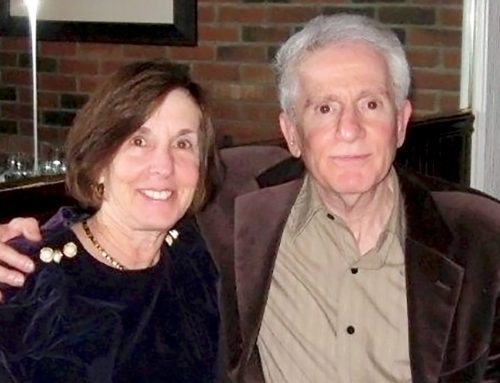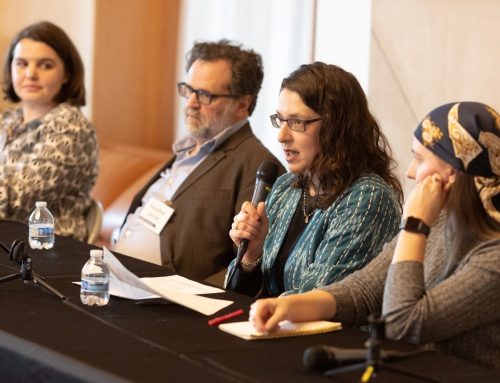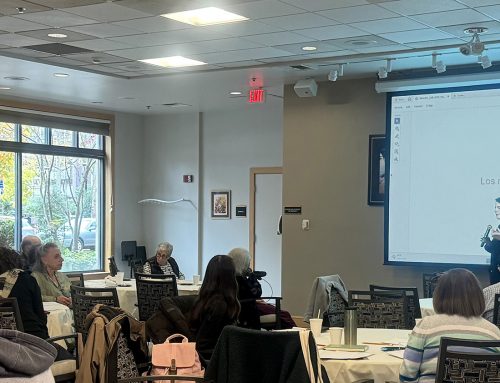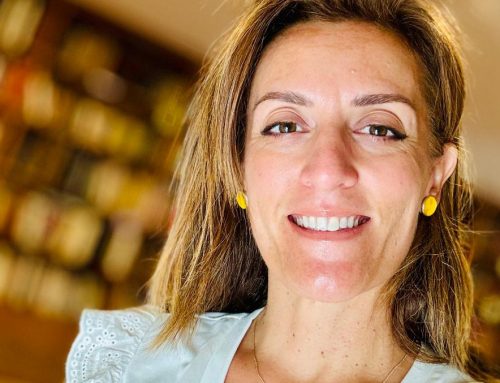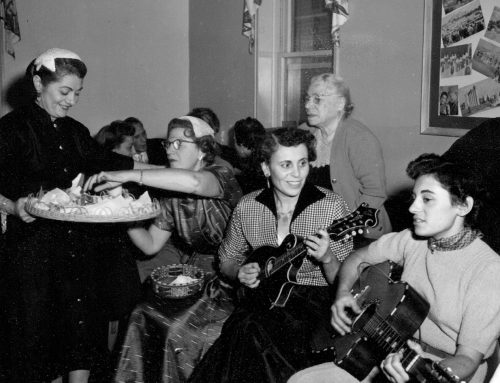Winner, general category – 2024 “Muestras Konsejas” essay competition. See all winning essays.
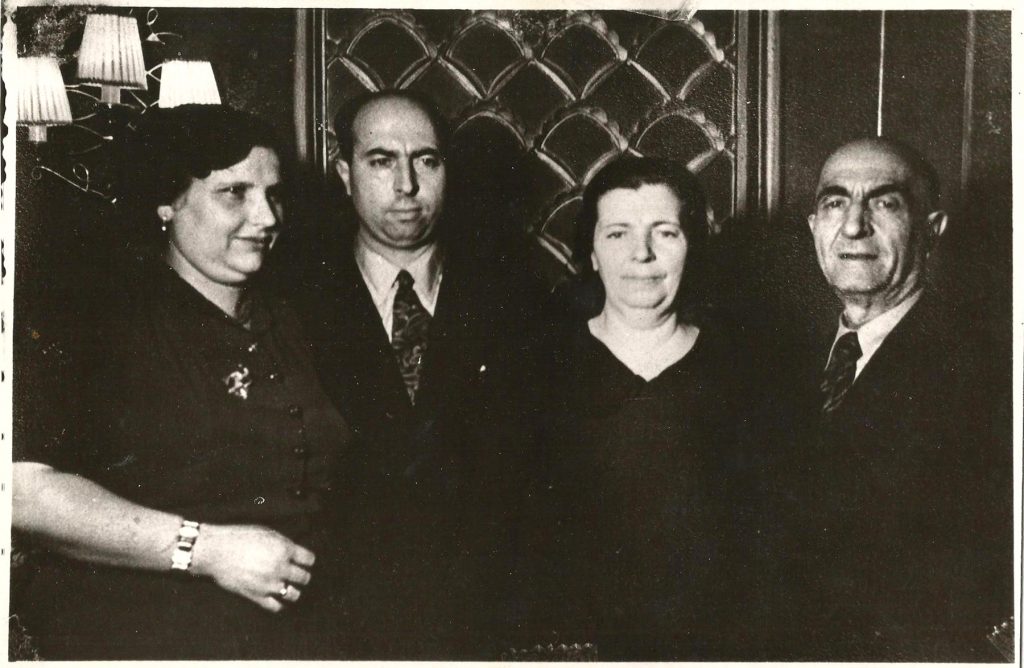
On right: Bulisu and Şapat Menda, the author’s great-grandparents. On left: Mirkado, their son, with his wife Bella, the author’s grandmother

Nuia Menda Malki
By Nuia Menda Malki
If God Wills It
Dedicated to my great-grandparents, Bulisu and Şapat Menda
*
A note to the reader:
In Turkish, the letter “Ş” is pronounced “sh” and the letter “Ç” is pronounced “ch.”
*
November 1912
Lüleburgaz, Ottoman Empire
A knock on the door. Quick, sharp, followed by a few seconds of silence. Knock, silence. Knock, silence. Bulisu, unheld by sleep’s motherly arms since her husband Şapat had left for war, lifted up her tired head from her small straw pillow. Next to hers was Şapat’s empty yet hopeful pillow. The very pillow she talked to just a few minutes ago, the way she’d sometimes talk to him before they went to bed. She believed the pillow shared her longing: like her, it yearned for the young, sweaty head that dropped into its embrace every day.
Knock, silence, knock, silence – it was Şapat’s signature knock. It had always been, even when they were children and he’d show up with vaziyo, empty, excuses to see her. Bulisu raised her heavy body up from the modest floor bed and motioned to the door, quickly but gently, holding her nine-months-big baby bump. Standing behind the door, for a moment she considered putting a veil on her thick brown hair, not to offend any Muslim passersby. But this was the Judyo, Jewish, neighborhood and most Muslim men had gone to fight. The invading Balkan forces were Christians for whom, she assumed, the veil didn’t matter. And more importantly, she wanted to open the door as fast as possible.
She began to turn the locks with shaky hands driven by a loud, excited heart. It seemed as if the more she hurried, the more dimly the candles next to the door flickered, and the more her hands struggled.
“Soy yo.” It’s me.
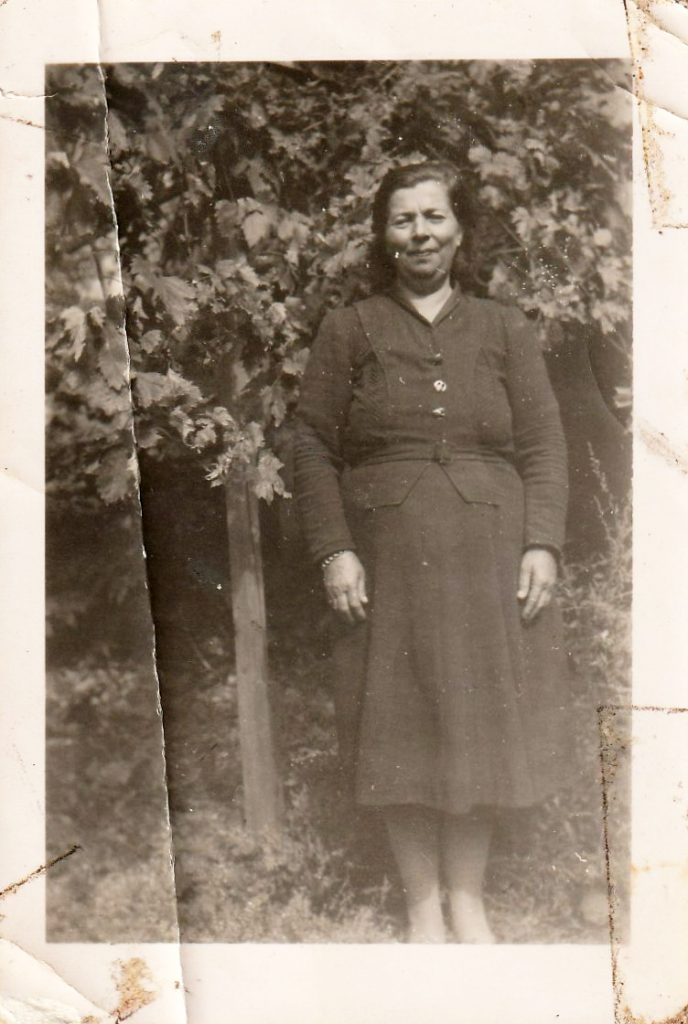
Bulisu as an older woman, around 49 years old, around the time of the Turkish Thrace pogroms.
Şapat’s whisper floated through the narrow, almost invisible cracks in the wooden door and reached her solaced ears. She noticed a sad, prepubescent quality in his voice like that of a broken child. When she finally opened the door, Bulisu gasped – what had happened to her mostroso, striking, husband? His brown eyes were missing their golden depth. They flatly stared from below the miserly remnants of his once bushy eyebrows. His skin was grimy, his cheeks shrunken, his lips creased. His proud nose weighed down and his spoony ears – oh, those big ears she loved to kiss and play with – sagged. It was as if his perky soul had left his complexion and gone into hiding somewhere deep inside his body. “Ke te izieron?” What did they do to you?
“Estoy aki, estoy aki,” he replied. I’m here, I’m here.
He, too, doubted that he was finally home. That his wife was real. That the baby had become so big. That in a few moments he could touch her and her belly.
Bulisu’s eyes quickly traveled up and down Şapat’s 1.70 meter tall body, searching for an open wound, a broken limb or a missing extremity. He was all in one piece. She noticed that his once red felt fez was now murky burgundy and without its tassel. There were patches of lifeless blood on his blue Ottoman uniform. Even the red trim of his tunic and pants were in varying shades of brown and black. His white knee-high wool socks, which he wore over his pants and secured in place with criss-crossed leather straps, were now gray and torn. The leather had managed to do its job but begged its heart out to be retired. His shoes – a pair he already owned; not issued by the military – must be a part of the miracle behind his survival, she thought. They kept his feet warm and made the roads walkable, all the way home.
Despite this life-defining moment, a moment they had both yearned for so much, there was no hugging in front of the door. No touching or kissing. Just in case. He walked in, seemingly unaffectionate and collected, and only when she closed the door behind them did they hug. Oh, how they hugged.
Şapat dropped his body on the only divan they had. Under other circumstances she would say something, as he was filthy and the divan was clean. When he took off his fez, Bulisu saw anxious gray strands among greasy browns – something Şapat didn’t have before. Why would he, he was only twenty-five. She served him water and kissed him on the forehead. Her kissing him like this wouldn’t take place under other circumstances either, because it was his privilege to kiss her on the forehead. It was the loving claim of a husband or a father: “you are mine.”
“Por díaz estoy kaminando. Kaminando i lavorando i gereyando. Día traz día. Sin parar.” I’ve been walking for days. Walking and laboring and fighting. Day after day. Nonstop.
“Ande estavaz?” Where were you? She asked as she pressed a piece of cloth in a small soapy water-filled bowl, squeezed it, and began to wipe his face and hands. “En Kırkkilise. Moz lo perdimoz.” In Kırkkilise. We lost it.
She looked at his eyes and wondered if he knew Lüleburgaz was lost, too. Had he noticed the raised Bulgarian flag in town?
“Lüleburgaz,” she said. “Moz…”
“Ya lo se,” he said. I know.
After Kırkkilise, he had fought for their beloved Lüleburgaz. He was there when enemy fireballs pervaded the familiar sky as far as his eye could see.
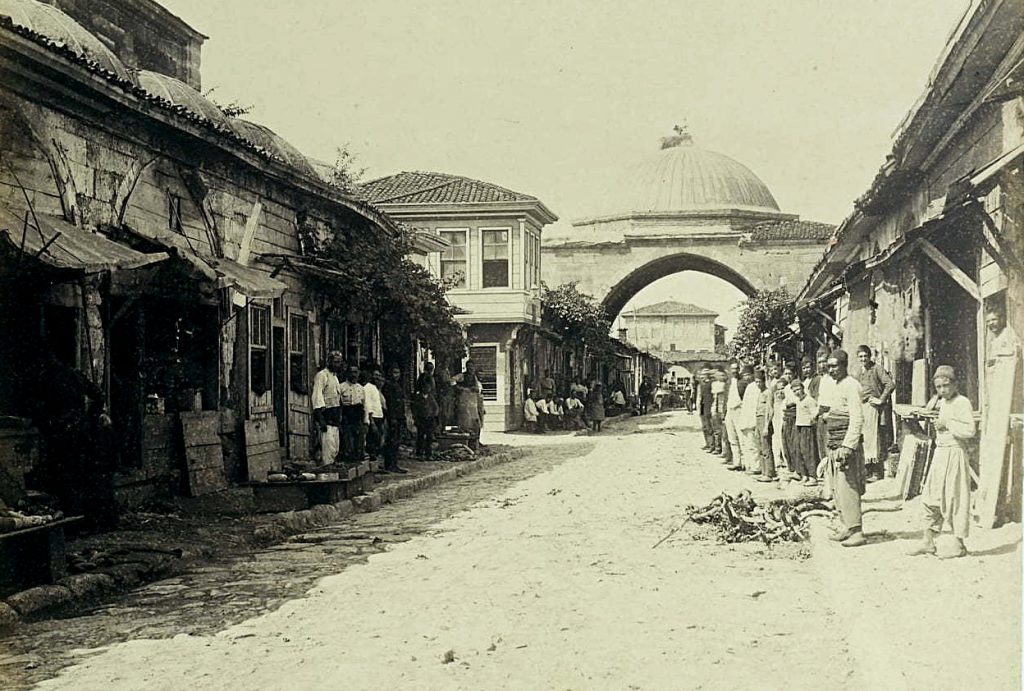
Lüleburgaz, 1912. Via the İstanbul University Rare Works Library.
When the first night of the battle brought not just a storm of Bulgarian troops but also the season’s first cold weather wave from the Balkans.
When soldiers’ shivering muscles and chattering teeth created a night-long dirge. When in the morning, wet dirt-roads threw incessant mud fits as soldiers tried to move and position machinery.
When news about the enemy’s flying vehicles dropping grenades from the sky in Edirne reached their ears and fear flooded them where their souls touched their bones. When gunfire intensified and hundreds of untrained and undertrained soldiers saw their limbs shatter – mostly the left hand or arm as that was the forward hand when holding the Mauser rifle.
When the heavy hand-to-hand fighting turned into what you would only call a bloodbath.
When the uninjured nursed the injured with a motherly yet soldier-like involvement. When they had to choose between keeping their clothes on or using them to stop comrades’ bleeding.
When neither military nor medical supplies sufficed.
When the last flicker of soul-light left the eyes of many.
When even horses and donkeys and mules fell to the ground with tongues hanging out, parched white after days of thirst.
When the army began to drag its hopeless feet away from the battle.
When soldiers shared any and every water source they found, only to die in heaps from cholera.
Then, when those that remained alive were consumed by such hunger that they ate pieces of tree trunks. Şapat did too. He was there for all of it, brave, loyal, fighting for his town and his country. His soul, his will to return home powered by the Livro de Ley in his pocket, a tiny book containing a part of the Torah. He took it out and kissed it at every difficulty. He prayed to see the day he’d be a father again. Si kere el Dio… si kere el Dio… He was a first generation Judyo soldier. A Rediff – a reservist infantryman – a novelty in the family. Neither his father, Eliezer, nor his father-in-law, Davit, had served. Nor his grampapas. It just wasn’t mandatory before.
Now sitting on the divan in his single-room house, Şapat could see that everything was exactly as he left it. The floor bed in the corner with its two straw pillows. Next to it the hammock made of old white cloth, fastened to the ceiling, on which Eliezer, their firstborn boy named after his own father, slept before the Angel of Death took him away. It was also where the new baby would sleep. Then the ropes tied to rafters that served as clothing hangers. In the middle, the board set on logs around which they squat for meals. More ropes tied to rafters on the wall next to the door on which kitchen utensils hung. Three iron pots. The beautiful menorah, a wedding gift from his in-laws. The shabbat meçikas, cotton-ball candles, inside the copper bowl. Down below, the floorboard that opened to the cellar downstairs. Before leaving for war, he had filled it to the brim with large sacks of rice and beans he brought from the family’s grain store – a trade they’d practiced for generations. The secret to the family’s survival.
“De ke estas solika?” he asked. Why are you alone?
She explained that all this time she had stayed with her parents, only two houses over. Then today, she told them she’d go check how much rice they had left. An excuse to be home and lie down in their bed, next to his pillow.
“İ komo estan muestros famiyas?” And how are our families?
Everyone was fine, she said.
“Todos aki?” All here?
“Si.” Yes.
Many Judyo had left the wider Thrace region because of the Balkan Wars. Thousands. Taking the Orient Express from Edirne to Istanbul, passing through the south of Lüleburgaz. But now the Bulgarians had cut the Oriental Railways off. Given her condition and their long-held love of Lüleburgaz – they, their parents, their grandparents, and their great grandparents had all lived here – they would decide to stay put, train or no train, pregnant or not pregnant, peace or war.
As Bulgarians set Muslim villages on fire, smoke was seen in all directions. Yet, Şapat believed Turks would recover Lüleburgaz. And that Judyos would be safe again. Turks were kind to Judyos. He couldn’t imagine it any other way.
“Kerez arroz?” she asked. Do you want rice?
After some twenty minutes of mutually comforting silence, she brought him arroz and a kuchara, a spoon, and sat next to him. She assumed he’d gulp it down. Instead, he was painfully slow about eating. He looked like he had forgotten how to do it.
“Esta muy savroza.” It’s delicious, he said. A hesitant tear formed around the corner of his eye.
As she looked at him, sadness accumulated in her upper chest, moving upward, wanting to gush out, turn into a scream: “Maldicho seas tu, rey Ferdinan!”1 Cursed be you, you King Ferdinand! Yet her mouth was sealed shut with fear – fear that if she cried or complained or cursed, something worse might happen. It had been one thing after another since Eliezer’s death several months earlier. Then came that horrible night in August when the earth shook every living creature on it, toppled nocturnal candles, caused fires, and devoured one in three houses. Then conscription. The war. Cholera. She was sure the year 1912 was dezmazalado, unlucky, but also felt guilty for thinking this way because, look, her husband was home. Look, she was about to bear another child.
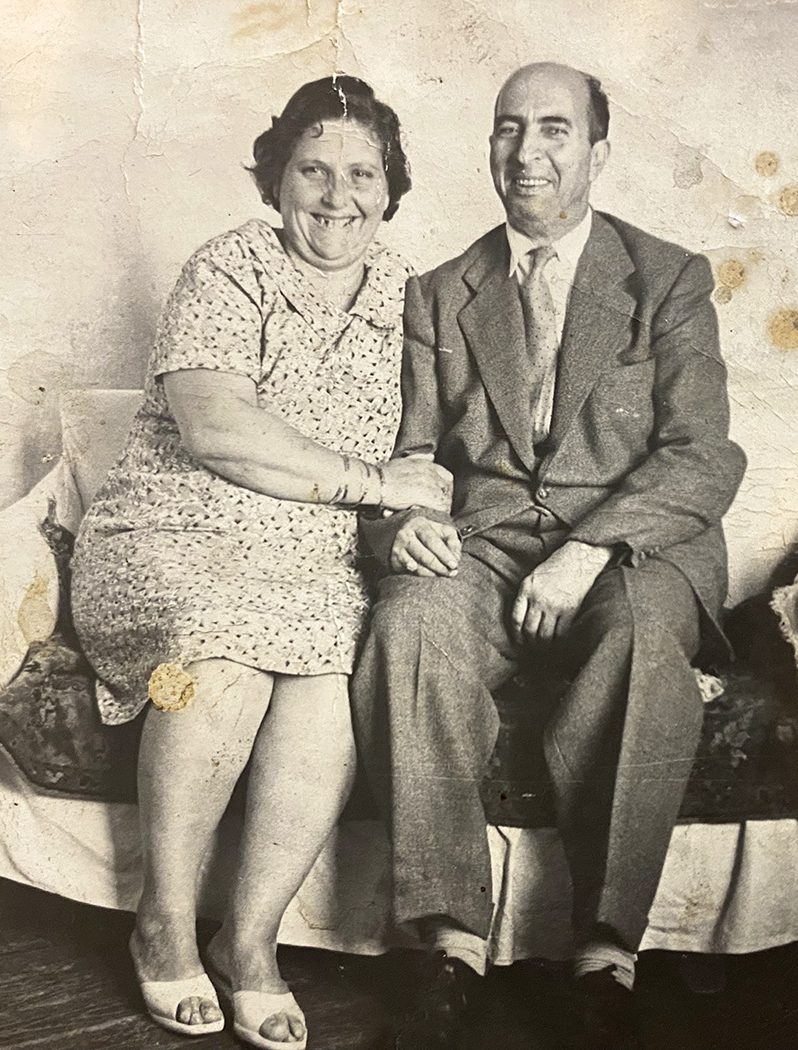
Mirkado Menda and his wife Bella, the author’s grandarents
This time they would not name the baby after their parents, as was tradition. No Eliezer or Zafira, Şapat’s mother’s name. If it were a boy, they’d call him Mirkado. Mirkada, if a girl. This name meant “sold.” They would perform a ritual to sell the little creature to a neighbor, symbolically, to change families, to change luck, to confuse the Angel of Death were He to seek this family again. Maybe Bulisu would even see this baby grow up, get married and bear ijos, children. Si kere el Dio.
A few days later, under such angst came to a warring world Mirkado Menda, this author’s grampapa. The ritual worked; the Angel of Death couldn’t find grampapa until 1998. But He pursued the people and the things that were the most dear to him, time after time, starting with the 1934 Turkish Thrace pogroms.
If only grampapa could break the kayadez, silence, and scream: “La estreya ke les kayga!” May their star fall.
*
1 A verse from O Madre Mia, a Ladino dirge about a Judiya mother losing her son at the Battle of Lüleburgaz. To listen, please visit: https://www.youtube.com/watch?v=oKCqI08KWNc.
Presented in partnership with the Sephardic Brotherhood of America, the 2023-2024 “Muestras Konsejas” writing contest opened a new space for the telling of Sephardic stories. Writers were asked to share an original work of prose (fictional or memoiristic) that gives voice to the experiences of the Ladino-speaking Sephardic Jewish communities (whether from family lore, lived experience, community heritage, life stories, etc.). Stories from all over the world were read by an expert panel of judges, who selected four finalists (across both “General” and “Student” submission categories) as the inaugural winners.

